Read the plan for living with Covid in Englandpublished at 16:55 GMT 21 February 2022
The government has just published its plan for living with Covid in full - you can read it all here, external.
At a news conference, Boris Johnson says he is not declaring victory over Covid, after announcing end to all restrictions in England
He defends scrapping free tests from 1 April, saying vulnerable people will continue to have access to them
The budget for the testing programme was bigger than that of the Home Office last year, he adds
From Thursday, people with a positive test will no longer need to self-isolate but will still be advised to stay at home
Other nations have different rules: N Ireland has scrapped all restrictions, Wales is at alert level zero, and Scotland has eased rules but some remain
England's Chief Medical Officer Chris Whitty says the number of people in hospital with Covid - more than 11,000 in the UK - remains significant but is falling
Labour leader Sir Keir Starmer says that it looks like, for Johnson, living with Covid "means ignoring it"
People most vulnerable to Covid will be offered an additional booster vaccine from the spring
Edited by Owen Amos
The government has just published its plan for living with Covid in full - you can read it all here, external.
The prime minister says Covid restrictions put "a heavy toll" on our economy, society and mental wellbeing.
"We do not need to pay that cost any longer," he tells MPs.
With the population protected by vaccines and the capabilities to respond rapidly to a resurgence or new variants, Johnson says it's "time we got our confidence back".
We don't need laws to "compel people to be considerate to others" and can instead rely on their "sense of responsibility", he says.
"Let us learn to live with this virus and continue protecting ourselves and others without restrictions on our freedoms," he finishes his statement by saying.
Boris Johnson says the UK will host a global Covid preparedness summit next month.
The cost of the pandemic has been huge but "we do not have to pay the price any longer", he adds.
Boris Johnson notes that Sage - the group that gives advice to the government - says there is uncertainty about the path of the virus in future. It's possible there will be new variants that will be worse than Omicron.
Because of this, the ONS infection survey will continue and there will remain a strong domestic surveillance system of the virus.
There will also be the ability to ramp testing back up in the NHS and in other settings if need be, he says.
Free Covid testing will end for the general public in England from 1 April, Boris Johnson announces.
But he says the government will continue to provide free tests for symptomatic people from the oldest age groups and those who are most vulnerable.
He adds that the government will work with retailers to ensure everyone who wants a test can buy one.
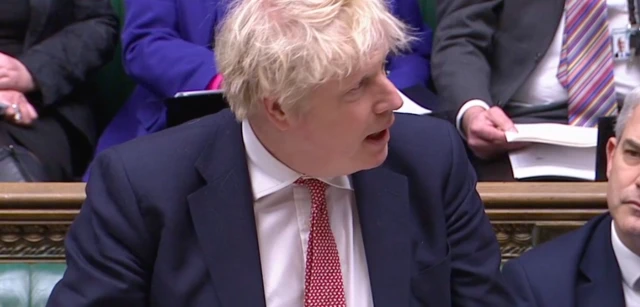 Image source, House of Commons
Image source, House of CommonsThe cost of Covid vaccinations and testing has been immense, the budget for them coming to more than that for the entire Home Office, the PM says.
Testing has cost £15.7bn, he tells MPs.
The PM says levels of immunity are high and deaths are low - and that's why the restrictions can be lifted now.
And he goes on to say testing on a mass scale is much less important with the Omicron variant.
From Thursday, the legal requirement to self-isolate after a positive Covid test will be removed in England, Boris Johnson announces.
Self-isolation payments will also end from this date.
Boris Johnson opens his statement by sending his best wishes to the Queen for a "full and swift recovery" from Covid.
He adds that the country is ready to move to a new stage of its movement out of coronavirus restrictions.
Prime Minister Boris Johnson is getting to his feet in the Commons to give his statement on "living with Covid".
Stick with us for the latest and watch by clicking on the play button at the top of the page.
We're expecting to hear from the prime minister shortly, who'll be speaking in the House of Commons.
Before we do, we've just had the latest government coronavirus figures through.
They show 38,409 more coronavirus cases have been reported and that there have been a further 15 deaths within 28 days of a positive test.
The prime minister is due to set out his plans for "living with Covid" to MPs shortly.
We're expecting Boris Johnson to announce all remaining legal restrictions in England, including the requirement to self-isolate after testing positive, will be lifted.
Free testing is also expected to be scaled back, amid reports of tensions between the Department of Health and the Treasury over the cost.
We'll bring you all the latest updates and analysis here.
 Nick Triggle
Nick Triggle
Health Correspondent
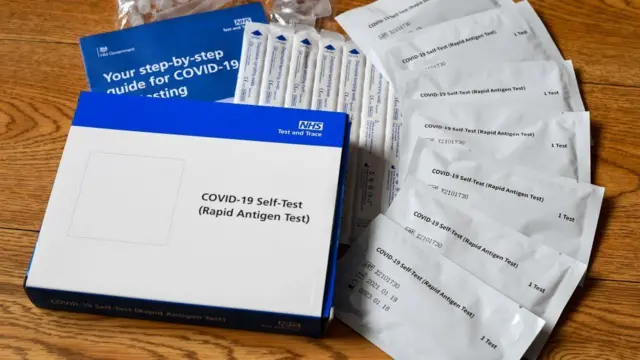 Image source, Getty Images
Image source, Getty ImagesDespite the huge number of Covid infections this winter, the overall number of deaths has remained in line with what we would normally see during winter.
That suggests Covid is no longer an exceptional threat, so it’s understandable the response taken should be reviewed. Covid will now have to compete with other spending priorities.
During the pandemic, £37bn has been set aside for testing and tracing. That’s a huge sum – more than has been budgeted for GP care over the same period. It could, for example, make huge inroads into the hospital waiting list.
A big scale-back of testing is expected. Most experts agree this is warranted, but needs to be done carefully.
Mass PCR testing in the community is almost certain to go as the rules on isolation end.
But these gold standard tests will be kept in hospitals to diagnose patients who are seriously ill and to keep an eye out on variants.
Many believe the Office for National Statistics surveillance survey, which costs £500,000 a year, can be done on a smaller scale to keep a check on how the virus is spreading.
The trickiest call is on rapid tests. They will be vital for high-risk settings such as care homes.
But to what extent should the government make them available to the wider public so they can test themselves when mixing with vulnerable friends and family?
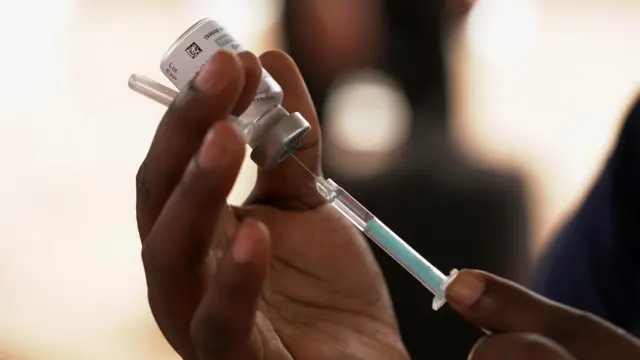
BBC Panorama has been investigating how wealthy countries and drug companies have skewed the vaccine rollout
While covid restrictions may be lifted in the UK, poorer countries are still struggling to get vaccines.
Twelve billion doses have been manufactured globally, which is enough to give two jabs to every adult on the planet. But in low-income countries, only 6.5% of people have been protected.
The World Health Organization (WHO) says its Covid project is running out of cash and doesn’t even have enough money to deliver vaccines donated by richer countries. There are also concerns that other variants may emerge if more of the world is not fully vaccinated.
“People are exhausted. They want out of this pandemic,” Bruce Aylward, a senior WHO adviser, said in an interview for BBC Panorama. “Well, these viruses that they're worried about, the Omicrons, the Deltas, the Betas, they're not arising in the UK. They're arising in other parts of the world where we're not sharing the vaccines.”
Former Prime Minister Gordon Brown tells the programme that the vaccine divide is the biggest international policy failure of our times.

 Kerry Allen
Kerry Allen
BBC Monitoring, Chinese Media Analyst
 Image source, EPA
Image source, EPAAs the Winter Olympics ends and athletes return home clutching their medals, Chinese papers are today praising the Beijing Games' “closed loop” system, saying it successfully prevented any potential Covid-19 outbreaks at the event.
The Xinhua news agency says that China “lived up to its promise of delivering the world a ‘safe and splendid’ Winter Olympics”.
The Global Times adds that 437 Olympic participants tested positive since 23 January, but that the vast majority “didn’t need medical treatment”.
The paper quotes Han Zirong, secretary general of the Beijing Organising Committee, as saying that the measures implemented ensured that Beijing was “one of the safest places in the world”.
In January, there were concerns that an outbreak of the Omicron variant in China’s capital city could put a dampener on the event.
China, a country with a zero-Covid strategy, was also concerned that an influx of foreigners could lead to a super-spreader event inside the Olympic village.
However, athletes and Olympic personnel were quarantined on arrival into the country and were routinely tested. Special transport was arranged to avoid them having any contact with the wider Beijing community. Mask-wearing was also strictly enforced, although athletes were allowed to remove their masks on the podiums and during photoshoots.
Attendance was also restricted at this year’s event; few spectators were allowed into the Olympic venues to watch athletes compete.
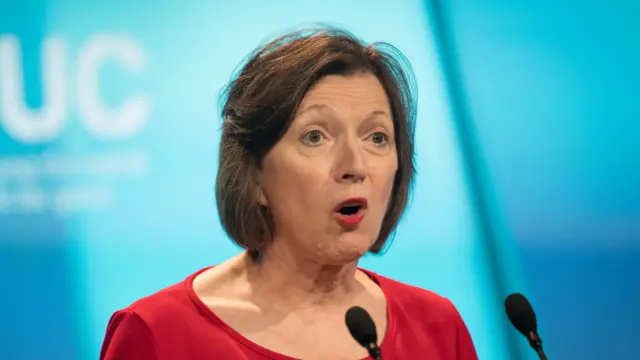 Image source, PA Media
Image source, PA MediaToo many low-paid workers cannot afford to stay at home when they are sick, the head of the Trades Union Congress says.
Frances O'Grady tells BBC Radio 4's World at One programme she is really worried sick pay will return to as it was before the pandemic - with workers only entitled to sick pay after day four and two million workers not qualifying at all.
With the legal requirement to self-isolate expected to be scrapped in England, there are concerns support payments for those on low-pay who are self-isolating could also go.
"Surely one of the lessons of Covid is that for our future resilience we need to make sure that sick pay allows people to make that choice to stay home when they should, to stop spreading infections, as opposed to having to go into work because they have to feed their families," O'Grady says.
She also calls for the government to keep free testing, saying the government cannot rely on employers to "do the right thing" and pay for tests for staff.
A cabinet meeting has ended with an agreement to sign off Boris Johnson's "living with Covid" plan, our political editor Laura Kuenssberg says.
The meeting took place later than expected as there was a delay over a dispute about funding for Covid tests.
As we reported earlier, the stand-off has been resolved, with no extra funding being made available.
At the meeting, ministers agreed to retain an effective system to monitor Covid, rather than mass testing, Kuenssberg says.
She says Johnson told ministers "we need the best possible eyes in the crow's nest to spot the iceberg".
Kuenssberg understands the Office for National Statistics surveillance survey will continue, but on a slightly smaller scale.
The health secretary is urging everyone to get those top-up jabs as soon as they are eligible.
Sajid Javid says: "Following the JCVI’s advice, I have asked the NHS to prepare to offer those eligible a vaccine from around six months after their last dose and they will set out further details in due course."
"The JCVI will keep under review whether the booster programme should be extended to further at-risk groups," he adds.
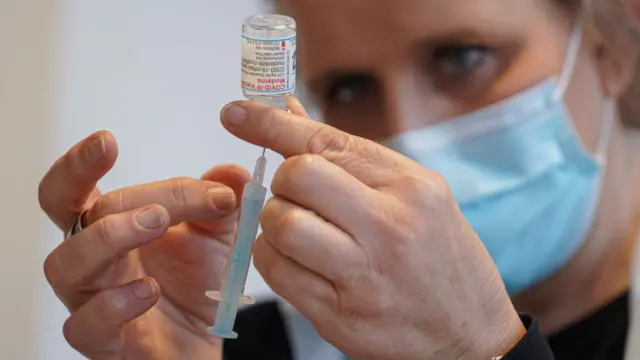 Image source, Getty Images
Image source, Getty ImagesThe government's Joint Committee on Vaccination and Immunisation (JCVI) describes the decision to offer the most vulnerable groups an additional booster dose as a "precautionary strategy to maintain high levels of immunity".
Eligible adults will be offered a Moderna or Pfizer vaccine, while those aged 12 to 18-years-old who are eligible will be offered the Pfizer vaccine.
Currently everyone aged 16 and over and some children aged 12 to 15 who are at higher risk are eligible for a third booster dose.
People who are severely immunosuppressed have already been offered a fourth dose and under the new advice, will be offered a fifth dose six months later.
The JCVI has provided additional interim advice that a further booster in the autumn of 2022 is likely to be advised for people who are at higher risk of severe Covid.
The committee says it is too early to set out precise details of what the programme may look like but more definitive advice would be provided in due course.
Those most vulnerable to Covid will be offered an additional booster vaccine from the spring and six months after their last dose, the health secretary has announced.
Sajid Javid says he has accepted the advice from the government's Joint Committee on Vaccination and Immunisation and all four UK nations also intend to follow the advice.
It covers people aged 75 years and over, residents in care homes for older adults, and people aged 12 years and over who are immunosuppressed.
Evidence shows immunity from vaccination declines over time and many older adults received their most recent dose in September or October 2021.